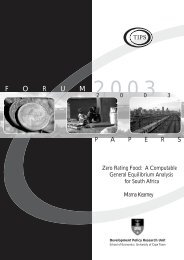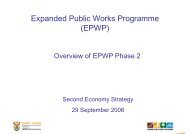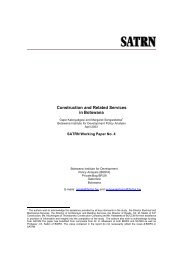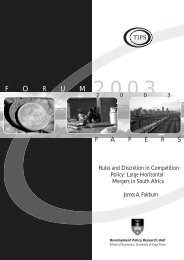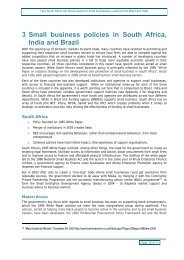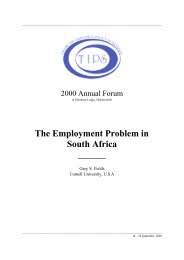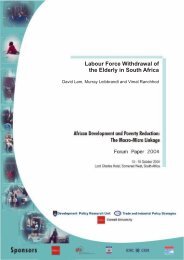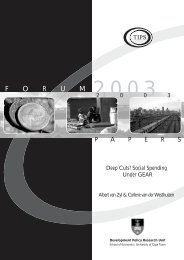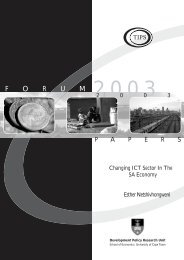Monitor Vol 39 08_Final_Nov08.pdf - tips
Monitor Vol 39 08_Final_Nov08.pdf - tips
Monitor Vol 39 08_Final_Nov08.pdf - tips
You also want an ePaper? Increase the reach of your titles
YUMPU automatically turns print PDFs into web optimized ePapers that Google loves.
Environmental policy<br />
48<br />
Trade & Industry <strong>Monitor</strong><br />
4. Prospects for Expansion<br />
The challenges related to on-farm and off-farm technical processes and<br />
policies are reviewed in Box 1. Those linked to international policies are<br />
reviewed in Box 2, which gives an example of the prospects for support<br />
under Kyoto.<br />
In terms of adaptation challenges on-farm, economies of scale, especially<br />
in ethanol production, are likely to favour large-scale production systems.<br />
Adaptation on small farms will depend on outgrower schemes, or on the<br />
successful engagement of co-operatives and other producer organisations.<br />
In the case of off-farm, how far existing agro-industry will be able<br />
to transform to biofuels production, and what roles public and private<br />
investment may have, will be context-specific.<br />
The arguments above illustrate how many different dimensions there are<br />
to analyse when seeking to understand the impact of biofuels expansion<br />
on agricultural growth and poverty. The net implications are difficult to<br />
identify, and meaningless unless contextualised – which we attempt to<br />
do on the basis of three typical cases in the concluding section. It is clear<br />
though that many of the problems that emerge from biofuels are not<br />
unique to biofuels but are challenges that have faced agricultural development<br />
policy for many decades. However, given the potential rate of<br />
increase of biofuels production, it is possible that the sub-sector may provide<br />
a new impetus and urgency to efforts to solve some old problems.<br />
Major Adaptation challenges<br />
On-farm<br />
• Institutional structures: adapting to fit production models that allow economies of<br />
scale. Large-scale systems are often economically favoured, so smallholder farmers<br />
might need to organise into cooperatives and/or outgrower schemes to allow access<br />
to markets.<br />
• Environmental impacts: increased/decreased soil fertility; water pollution; downstream<br />
effects such as the draining of wetlands.<br />
• Technology: access to farm technology which helps increase yields (e.g. the Brazilian<br />
experience suggests that this can be achieved through the selection of better<br />
varieties and irrigation).<br />
• Changes in land use affecting: access to land; effects of biofuels on cost of land<br />
which are currently poorly understood.<br />
• Need for flexibility to changes in the prices of feedstocks and to changes in the<br />
prices of inputs.<br />
Off-farm<br />
• Employment patterns: employment patterns are expected to change as biofuel sectors<br />
grow. Much work in the biofuels sector is non-skilled, but requirements for<br />
skilled labour are likely to increase.<br />
• Investment: biofuel processing and distribution infrastructure can require substan-<br />
tial up front investment.<br />
• Need for flexibility: converting current production systems into biofuels production<br />
systems (e.g. existing legacy of sugar processing plants in Caribbean countries<br />
could be a constraint); flexibility within processing plants is also a constraint (e.g.<br />
many Brazilian plants are designed to switch between sugar and ethanol production<br />
which allows adaptation to price changes).<br />
• Adapting regulations: changing regulation to suit efficient production processes<br />
will be needed in some cases. (e.g. in some countries efficiency gains through cogeneration<br />
is not an option because producers are not allowed to sell into the<br />
grid).<br />
Source: Adapted from Peskett et al 2007<br />
Implications of the Kyoto Protocol for biofuels adaptation<br />
Because biofuels have the potential to reduce greenhouse gas emissions, the Kyoto<br />
Protocol’s Clean Development Mechanism (CDM) offers potential for funding biofuels<br />
projects in developing countries. However, because of the complex rules, processes and<br />
politics of the CDM, access to the CDM by the Least Developed Countries is restricted,<br />
and smaller producers are bypassed in those countries. For example:<br />
• Biomass projects (a common type of CDM project) are generally large in scale and<br />
related to grid-based power systems. Their geographical spread is also limited, with<br />
most projects in larger developing countries and few in Africa.<br />
• Rules for land-use related projects in the CDM are restricted to include only afforestation,<br />
reforestation and certain biomass related processes (such as methane<br />
capture from biodegradation) while the EU Emissions Trading System (EU ETS), the<br />
largest functioning carbon market, does not currently accept land-use projects.<br />
• Small farmers are less able to access the carbon market because they lack expertise<br />
in implementing complex methodologies, ex-post payment systems mean there is<br />
a lack of up front funding for projects and investors are less interested in smaller<br />
projects with high risks and long timescales. Small-scale methodologies with simpler<br />
requirements and processes for bundling projects have been developed to<br />
address some of these issues, but there is currently no small scale methodology<br />
for liquid biofuels, and only one large scale methodology based on use of waste<br />
cooking oil for biodiesel (CD4CDM 2007) .<br />
• Despite their potential for bringing sustainable development benefits (a core aim of<br />
the CDM) biofuel projects are less attractive to investors because of high abatement<br />
costs, difficulties in proving additionality for projects and difficulties in calculating<br />
reduced greenhouse gas emissions of projects (Bakker 2006).<br />
Negotiations over the next phase of the Kyoto Protocol (post-2012) are considering<br />
options for programmatic approaches to the CDM, meaning that developing countries<br />
could benefit from finance from developed countries for putting in place biofuels policies.<br />
However, perverse incentives could arise, discouraging developing countries from putting<br />
in place legislation on biofuels because of rules over ‘additionality’ under the CDM.<br />
There are alternative carbon markets outside of the Kyoto Protocol that show potential<br />
for supporting moves towards biofuels production in developing countries. These<br />
voluntary markets are smaller, but tend to focus on smaller projects aimed at reducing<br />
greenhouse gases and alleviating poverty. However, the quality of projects, in both environmental<br />
and social terms, can also be very variable, implying a need for more universal<br />
standards, an issue currently under consideration by the UK Department for Environment<br />
and Rural Affairs (Defra).



